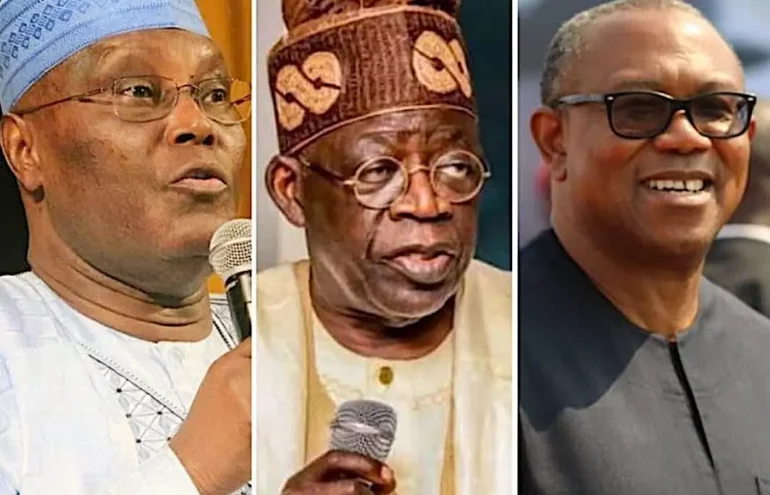The Supreme Court has commenced hearing in the appeal by the Peoples Democratic Party (PDP), Labour Party (LP), and Allied Peoples Movement (APM), seeking the nullification of President Bola Tinubu’s election.
Justice Inyang Okoro is the leader of the panel of seven justices, which include Justice Helen Ogunwumiju, Justice Ibrahim Saulawa, Justice Adamu Jauro, Justice Tijani Abubakar, Justice Emmanuel Agim and Justice Lawal Garba.
The National Chairman of the ruling All Progressives Congress (APC), Abdullahi Ganduje; LP chairman, Julius Abure; the Chief of Staff to the President, Femi Gbajabiamila; the National Security Adviser (NSA) Nuhu Ribadu and other party faithful are in attendance.
The Supreme Court is expected to hear the motion by the PDP presidential candidate Atiku Abubakar, seeking to bring fresh evidence to prove that President Tinubu submitted a forged certificate to the Independent National Electoral Commission, INEC.
At the hearing on Monday, the counsel to Atiku Abubakar, Chris Uche, was the first to address the court on the Chicago State University, CSU, results.
Uche said the issue involving the certificate is a weighty one, grave and constitutional, which the Supreme Court should admit as fresh evidence.
According to him, the court has a duty to take a look at the certificate and reach a decision by avoiding the issue of technicality.
Justice Inyang Okoro asked him if the Supreme Court should rely on the Electoral Act or the Constitution.
Uche replies that the issue is a constitutional one that the court should look into.
Justice Emmanuel Agim asked what the nature of Atiku’s fresh documents that he seeks to tender before the court is.
He also asked if the testimony by the CSU Registrar was conducted in a court.
Justice Okoro asked Uche why he wants the Supreme Court to brush aside constitutional provisions and entertain the fresh evidence.
Uche explained that section 233 of the constitution gives the court the power to entertain whether a person was properly elected.
In his argument, counsel to President Bola Tinubu, Wole Olanikpekun, says the question of 180 days is clear.
He wondered where the court would compartmentalize Atiku’s fresh evidence. He describes it as an application in wonderland and ought to be dismissed as it lacks merit.
He added that the court is bound by law, and the law should be interpreted as it is, and not how it ought to be.
Uche responded to the issue raised about the CSU proceedings.
He said there is a slight distinction between proceedings in the US and the UK.
“In the US, that is how court proceedings are done.
“Mr Tinubu was represented by a US lawyer, but he did not object to the proceedings being held in Atiku’s lawyer’s law office.”
Uche said depositions are more effective than letters from the CSU authorities regarding the authenticity of Mr Tinubu’s academic records.
Justice Okoro said criminal matters have to be proved beyond reasonable doubt. But in this case, there are two conflicting letters from the CSU – one authenticating the president’s certificate and another discrediting it. He asked Mr Uche which one should the court rely on?
Uche refered the court to a letter earlier issued to Michael Enahoro-Ebah, a lawyer, who testified for Atiku against Mr Tinubu at the Presidential Election Petition Court in Abuja.
INEC lawyer, Abubakar Mahmoud, asked the Supreme Court to dismiss Atiku’s application seeking to tender Tinubu’s academic records.
Olanikpekun also said fresh evidence is not admissible at this point.
He argued that the CSU depositions are dormant until the deponent comes to court and testify, adding that INEC should have been a party at the deposition proceedings in the US.
Olanipekun further said the question of 180 days (the statutory period within which an election petition should be filed and determined) is clear. It is sacrosanct. It cannot be shifted. Therefore, Atiku cannot seek to tender fresh evidence at the Supreme Court.
Counsel for the APC, Akin Olujinmi also said the application lacks merit, it is misconceived and urged the court to dismiss it.
He added that the Atiku cannot smuggle a document into the Supreme Court without first tendering the same at the trial court.
Olujinmi said the burden is on Atiku to prove why the fresh evidence should be admitted by the Supreme Court.


